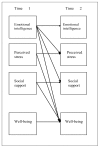The Relationship between Emotional Intelligence and Psychological Well-Being among Male University Students: The Mediating Role of Perceived Social Support and Perceived Stress
- PMID: 32131478
- PMCID: PMC7084724
- DOI: 10.3390/ijerph17051605
The Relationship between Emotional Intelligence and Psychological Well-Being among Male University Students: The Mediating Role of Perceived Social Support and Perceived Stress
Abstract
This study aimed to examine the subject of emotional intelligence (EI), which has received increased attention from scholars over the past few decades. The study utilized a quantitative longitudinal approach to attain the objective of understanding the correlation between EI and psychological well-being. A sample consisting of only male students was sought in this study in a process that was guided by specific criteria. The study reveals that students' EI correlates positively with perceived social support and well-being at each time and across times. Negative relations are found between perceived stress and well-being at each time and across times. Results and findings reported in this study reveal that perceived social support partially mediates the longitudinal association between EI and well-being. Specifically, perceived stress does not mediate the longitudinal association between EI and well-being.
Keywords: cross-lagged; emotional intelligence; perceived social support; perceived stress; perceived well-being.
Conflict of interest statement
The authors declare no conflict of interest.
Figures



References
-
- Schutte N.S., Malouff J.M., Simunek M., McKenley J., Hollander S. Characteristic emotional intelligence and emotional well-being. Cognit. Emot. 2002;16:769–785. doi: 10.1080/02699930143000482. - DOI
-
- Kong F., Zhao J., You X. Social support mediates the influence of emotional intelligence on mental distress and life satisfaction in Chinese young adults. Personal. Individ. Differ. 2012;53:513–517. doi: 10.1016/j.paid.2012.04.021. - DOI
-
- Chao R.C. Managing perceived stress among college students: The roles of social support and dysfunctional coping. J. Coll. Couns. 2012;15:5–21. doi: 10.1002/j.2161-1882.2012.00002.x. - DOI
MeSH terms
LinkOut - more resources
Full Text Sources
Medical
Miscellaneous

